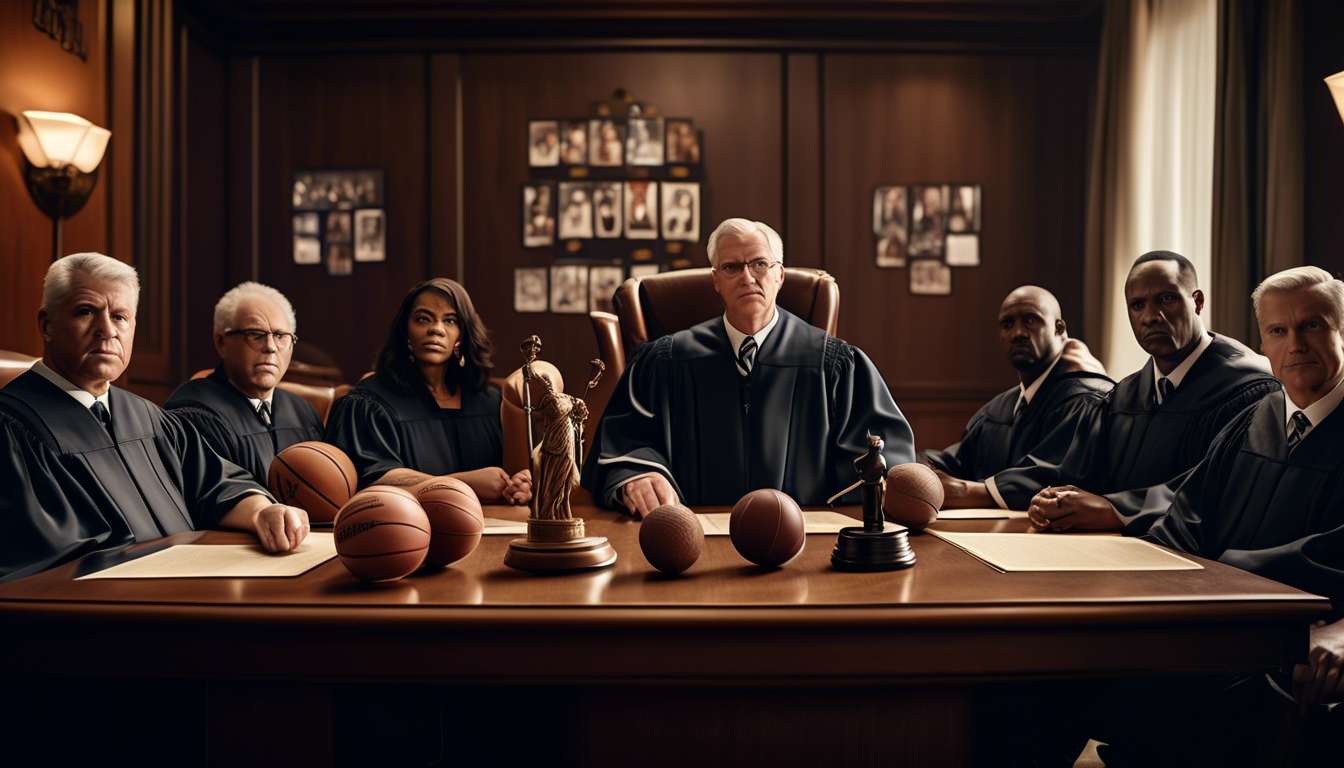As we delve into the intricate world of judicial decisions, we find ourselves particularly captivated by how the justices voted on the contentious issue of sports betting. Together, we navigate through the complexities of the legal landscape, seeking to understand the nuances that influenced their decisions.
This article aims to shed light on the pivotal votes cast by the Supreme Court justices, examining the interplay of:
- Legal principles
- Personal beliefs
- Societal impacts
These factors guided their deliberations. As a collective, we recognize the significance of this ruling, which not only reshaped the legal framework surrounding sports betting but also set a precedent for future cases.
By exploring the motivations and arguments presented, we hope to gain a deeper insight into the judicial process and its far-reaching implications.
Join us as we unravel this pivotal moment in legal history, offering a comprehensive analysis of how each justice’s vote contributed to shaping the future of sports betting.
Overview of Sports Betting Case
In the sports betting case, the Supreme Court evaluated the legality of states authorizing sports gambling under federal law. We felt the anticipation as the justices considered whether states could enact their own sports betting legislation without federal interference. This case wasn’t just about gambling; it was about states’ rights and federalism, topics that resonate deeply with those of us who value community autonomy and self-governance.
As the justices deliberated, we understood the stakes were high. The decision would not only impact sports betting enthusiasts but also affect state economies and local legislation. We found ourselves drawn into the legal arguments, realizing this wasn’t just a matter of placing bets but about defining the boundaries of state versus federal power.
Through careful consideration of the existing legislation, the justices weighed whether the federal ban on sports betting unduly restricted states’ rights. This case was more than a legal battle; it was a moment for us to reflect on our collective identity and autonomy.
Justice A’s Position and Rationale
Justice A firmly believed in state autonomy regarding sports betting regulation, free from federal intervention. This perspective aligns with those who prioritize:
- Local governance
- Community-driven decision-making
Justice A argued that sports betting legislation falls under states’ rights, emphasizing that local authorities:
- Are better positioned to understand residents’ needs
- Can address these needs more effectively
By allowing states to craft their own laws, we can:
- Foster a sense of belonging within communities
- Empower residents
Justice A’s rationale was based on the belief that decentralizing decision-making leads to more tailored and effective regulatory frameworks. This approach:
- Invites active participation in policy shaping
- Preserves states’ legislative powers
- Encourages trust in local systems
- Ensures community voices are heard in the legislative process
The justices, by considering this viewpoint, acknowledged the importance of states’ legislative powers. Justice A’s stance urges us to engage in discussions on sports betting, ensuring our participation in shaping the policies that impact us.
Justice B’s Stance and Justification
Justice B took a contrasting view, emphasizing the need for a uniform federal framework to regulate sports betting and ensure consistency across all states.
We can see the merit in Justice B’s stance, as it fosters a sense of unity and fairness across the country. By advocating for federal legislation, Justice B aims to prevent a patchwork of varying state laws that could lead to confusion and inequality in how sports betting is conducted.
Justice B’s Concerns:
- Potential for uneven enforcement
- Challenges posed to the market
- Challenges posed to consumers
With a nationwide approach, we would ensure that everyone, regardless of where they live, has the same opportunities and protections. This perspective reflects a desire for inclusivity and order, values that resonate with those of us who seek a cohesive community.
By supporting a federal framework, Justice B highlights the importance of collective progress over fragmented policy-making.
Dissenting Opinions and Arguments
Several justices expressed dissenting opinions, arguing that states should retain the right to regulate sports betting independently. They believed that empowering states to create their own legislation would foster a sense of community and respect for local values.
We understand that these justices felt that a one-size-fits-all federal approach could overlook the unique cultural and social dynamics present in different states. Their dissent highlights a fundamental belief in state autonomy, emphasizing that local governments are better suited to address their citizens’ needs regarding sports betting.
In their view, states should have the authority to craft legislation that reflects their residents’ interests, ensuring that the community’s voice is heard. By allowing each state to decide on sports betting regulations, we can foster a more inclusive and representative system.
These justices also argued that:
- State regulation encourages innovation and responsiveness.
- States can quickly adapt to changing circumstances and public sentiment.
Their dissent underscores the ongoing debate about federal versus state control in our legislative process.
Legal Precedents Considered
Several key legal precedents were examined to understand the implications of state versus federal control in the regulation of sports betting.
We delved into cases like Murphy v. NCAA, which challenged the Professional and Amateur Sports Protection Act (PASPA). The justices evaluated whether PASPA infringed on states’ rights to regulate sports betting within their borders. They were tasked with interpreting the balance of power between federal oversight and state autonomy—a fundamental aspect of our legislative framework.
As we explored these precedents, we saw how the justices navigated the complex interplay between existing legislation and the evolving landscape of sports betting. The decision ultimately hinged on the principle of anti-commandeering, which prevents the federal government from mandating state enforcement of federal regulations.
By striking down PASPA, the justices reinforced the idea that states should have the discretion to legislate sports betting, fostering a sense of empowerment and unity among states seeking to control their own regulatory destinies.
Public Opinion and Societal Impact
In recent years, we’ve witnessed a significant shift in public opinion towards more favorable views on the legalization of sports betting, reflecting broader societal changes. This growing acceptance influences how we perceive the role of justices in shaping legislation that aligns with our evolving values.
As more people embrace sports betting as a legitimate form of entertainment, we see it as part of a larger trend towards personal freedom and choice.
This societal embrace creates a sense of community among those who participate, bonding over shared experiences and friendly competition. As we gather to watch games and engage in discussions, sports betting becomes a thread that ties us together.
Our collective voice has pushed for legislation that reflects our interests, prompting justices to reconsider past rulings that might have been more restrictive.
By recognizing this shift, we demonstrate our commitment to shaping a society where our preferences and voices are acknowledged in the legislative process.
Implications for Future Legislation
As we continue to embrace sports betting, it’s crucial to consider how this trend will shape future legislative measures. The justices’ decisions have opened the door for states to take control, but we must ensure that legislation reflects our shared values and priorities. We need to balance economic benefits with ethical considerations, creating a framework that promotes responsible betting while curbing potential pitfalls.
In crafting future legislation, let’s focus on:
- Transparency
- Fairness
- Accessibility
By engaging in open dialogues with stakeholders, we can create laws that resonate with our communities. We must also anticipate technological advancements and their impact on the betting landscape, ensuring that new regulations are adaptable and forward-thinking.
Moreover, legislation should address issues like problem gambling and ensure that there are resources for those affected. As a community, we’re responsible for fostering an environment where sports betting is not just a privilege but a responsibly managed opportunity.
Together, we can make informed decisions that benefit us all.
Analysis of Majority Decision
The majority decision demonstrates a clear intent to decentralize control, empowering states to regulate sports betting according to their unique needs and priorities. By doing so, the justices acknowledged the diverse landscape of state interests, allowing us to feel more connected to our local communities and their values. This approach respects the autonomy of states, fostering a sense of belonging as we navigate the complexities of sports betting laws.
As we analyze the decision, we see that the justices prioritized flexibility, recognizing that a one-size-fits-all federal mandate often falls short. This move could lead to innovative legislation that reflects the unique character of each state, creating a patchwork of diverse regulatory frameworks.
We appreciate how the justices have opened the door to more tailored solutions, which align with our collective desire for representation and inclusivity. By entrusting states with this responsibility, the majority decision strengthens our connection to both local governance and the broader national landscape.
Conclusion
Understanding Justices’ Votes on Sports Betting
The justices’ votes on sports betting encompass several key elements:
-
Positions and Dissenting Opinions
- Each justice’s stance on the issue, reflecting their interpretation of the law.
- Dissenting opinions offer insight into the contrasting legal reasoning and perspectives within the court.
-
Legal Precedents
- Historical cases and decisions that influenced the current ruling.
- How past rulings have shaped the court’s approach to sports betting.
-
Public Opinion
- The role of societal views and public sentiment in the court’s decision-making process.
- Influence of changing public attitudes towards sports betting.
-
Future Implications
- The court’s ruling sets a precedent for future legislation on sports betting.
- The impact on how this issue will be approached in the legal system moving forward.
Complex Blend of Legal Reasoning and Societal Factors
The majority decision reflects a nuanced combination of:
- Legal Analysis: Careful consideration of constitutional principles and legal frameworks.
- Societal Impact: Awareness of how changes in the legal stance on sports betting align with or challenge current societal norms and economic interests.
Evolving Landscape and Legislative Shaping
As sports betting continues to evolve:
- The ruling will influence future legislative efforts and regulatory measures.
- It will also guide how legal challenges to sports betting are addressed in the courts.
By understanding these components, one gains a comprehensive view of how the justices’ votes and the court’s ruling will shape the future of sports betting in the legal system.

